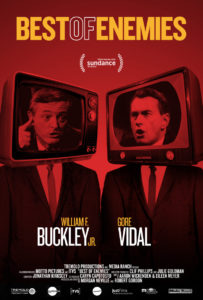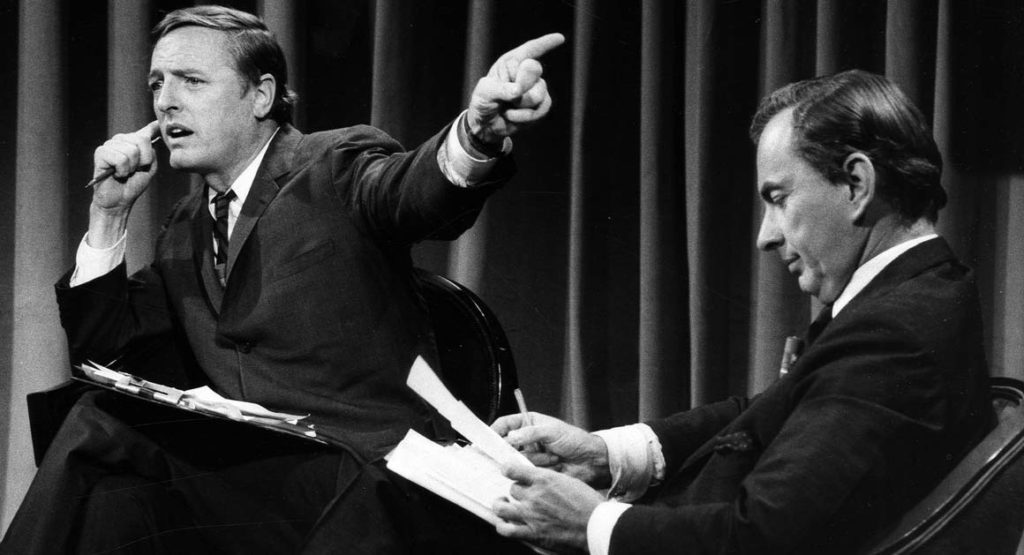Buckley v. Vidal, 1968: What Hath It Wrought??
DIRECTED BY ROBERT GORDON, MORGAN NEVILLE/2015
 Political discourse. We yell, we shout, we take sides. We get passionate and righteous, fuming and indignant. We hold our ground in our ideological spheres. Dismissal of our opposition comes quickly, almost as quickly our initial judgement of them. After all, it’s what they do on TV.
Political discourse. We yell, we shout, we take sides. We get passionate and righteous, fuming and indignant. We hold our ground in our ideological spheres. Dismissal of our opposition comes quickly, almost as quickly our initial judgement of them. After all, it’s what they do on TV.
It started innocently enough. In 1968, with the presidential election looming amid a tumultuous political landscape, ABC News is in third place of the three existing television networks. We are told that if there had been a forth, ABC would’ve then ranked forth instead. Another interviewee tells us that the joke was that the quickest way to end the Vietnam War would’ve been to air it on ABC, and it would’ve gotten cancelled in thirteen weeks. Desperate for ratings and hungry to distinguish itself from the competition in a respectable manner, ABC opted to do what today’s networks know to do by default: Stir the pot.
Political junkies of the day were already well aware of staunch conservative publisher William F. Buckley, Jr. and far-left author Gore Vidal. Two men’s respective stardoms, however, went beyond that sphere. Already appearing regularly on all manner of TV talk shows, Buckley and Vidal hailedfrom that time when magazine publishers and authors could be famous alongside of actors, comedians, and musicians. It was a bygone era in which “political satirist” was a valid showbiz career, and when cultural volatility was not yet synonymous with barriers in intellectual discourse. But that would of course come. Best of Enemies, the documentary chronicle of the ten televised debates that ABC News hired Buckley and Vidal to take part in, posits that this was perhaps the ground zero of the numbing, hollow, ringing spectacles of today’s Fox News/MSNBC/CNN world.

William F. Buckley, Jr. and Gore Vidal’s debates revisited in BEST OF ENEMIES.
Not that what ABC was doing was wrong, per se, the idea to put two of the most erudite, well spoken, and deeply ideological individuals on TV, mano a mano, intelligently debating the issues. But even then, the news media was broken. A broken reportage of broken systems that dictate a broken world. Buckley and Vidal nonetheless talked over one another, engaged in showboating oneupmanship, and allowed the whole affair to get personal. It made for some of the most compelling appointment viewing of all time. When composed and compelling Buckley (whom, despite his right wing stances, remained admireable even to lefties for his way with his rhetoric) lost his cool after Vidal labelling him a “crypto-nazi”, it made for an unforgettable TV moment, and a low point of Buckley’s public life.
Best of Enemies presents extended vintage footage of the actual debates, staged first at the 1968 Republican National Convention in Miami (described as remote enough to deter outside disruption) and the Democratic National Convention in Chicago (described by Vidal as a police state set amid a slaughterhouse. Accurate on both counts). But really, what it shows is a scene that is far, far gone, populated by individuals and demeanor unknown to my generation (I was born in 1973) and younger.
If anything, the film tends to play as depressing to those of us who reject the theatrical sound bite-driven barrages that pass for TV News debate today. We watch the archive footage play out recognizing only the most negative attributes of the happenings. Never mind that the Genie in Aladdin impersonated William F. Buckley. (As he also then impersonated Arsenio Hall, then far more relevant, but now equally forgotten.). Only in this 1968 age of modernity run amok could two elitist intellectuals such as these not only be tolerated by mass American audiences, but enthrall them.

ABC NEWS – ELECTION COVERAGE 1968 – “Convention Coverage” – Airdate in August 1968. (Photo by ABC Photo Archives/ABC via Getty Images) WILLIAM BUCKLEY;GORE VIDAL
Filmmakers Robert Gordon and Morgan Neville attempt to take the high road in giving both sides equal time and consideration, although if one were to posit that their deck is slightly stacked against the conservative, one may have a point. The film flows in such a manner that the well-admired, if snotty Buckley must be built up as typically unflappable and quick on his feet before being torn down so harshly first by Vidal then by his own anger. The “crypto-nazi” fallout is viewed as the flashpoint of his downfall from public relavence. Things got litigious, and the grudge remained for decades to come. The less likeable Vidal, with his cunning devilish features and (for lack of a better word) progressive lifestyle and worldview (a good fifty years ahead of its accepted time), outlived his opponent, and would have to be content to simply fade into cultural irrelevance behind a wall of his massive, authored tomes.
Best of Enemies brings both men back to the forefront, if only for it’s 87 minute running time. Their debates are framed effectively as something both respectable and unfortunate for their consequences. (Similar to how Star Wars is both amazing as a film experience and is lamented for inadvertantly birthing the blockbuster era post 1977.) The film takes us back to a very different yet very recognizable time in American history; an angry time of bigger protest and larger debate that was spurned on by two sharp-tounged, well dressed white elites cutting each other down on television.
Best of Enemies, a historical documentary made up of talking head interviews and vintage footage, might be particularly standard in it’s approach, even as it’s compelling throughout. Being that it’s about a TV event, perhaps it’s only fitting that the film itself plays aesthetically similar to TV. The difference is, that unlike the numbing, shouty debates of today’s 24 hour news cycle, intuitive viewers will not be compelled to tune out of this presentation. This is the pot is being stirred in a good and worthy way.

